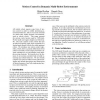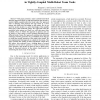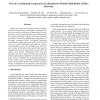28 search results - page 1 / 6 » Multi-robot team response to a multi-robot opponent team |
ROBOCUP
1999
Springer
13 years 11 months ago
1999
Springer
All mobile robots require some form of motion control in order to exhibit interesting autonomous behaviors. This is even more essential for multi-robot, highly-dynamic environment...
IROS
2006
IEEE
14 years 1 months ago
2006
IEEE
— This paper presents an adaptive causal model method (adaptive CMM) for fault diagnosis and recovery in complex multi-robot teams. We claim that a causal model approach is effec...
ICRA
2007
IEEE
14 years 1 months ago
2007
IEEE
— This paper presents a sensor analysis based fault detection approach (which we call SAFDetection) that is used to monitor tightly-coupled multi-robot team tasks. Our approach a...
AI
1999
Springer
13 years 7 months ago
1999
Springer
While terminology and some concepts of behavior-based robotics have become widespread, the central ideas are often lost as researchers try to scale behavior to higher levels of co...
ICDCSW
2006
IEEE
14 years 1 months ago
2006
IEEE
Mobile robot teams are particularly suited to applications where infrastructure is unavailable or damaged since they can be used to quickly form an infrastructure-less mobile ad h...



